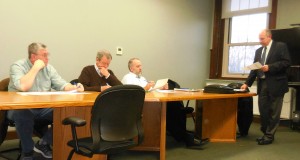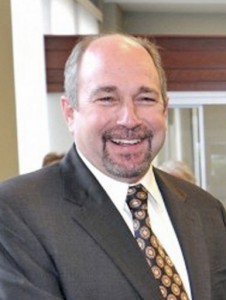WESTFIELD – On Thursday, the Finance Committee began a series of three meetings to discuss the city’s payment in lieu of taxes (ILOT) agreement with Westfield Gas & Electric. Thursday’s meeting covered gas and electric services, along with a discussion of the ILOT.
WG+E General Manager Dan Howard shared a 2016 survey on customer satisfaction, to which 3,800 responded, 25% of Westfield G&E’s customer base. The results ranged from 97% agreeing that WG+E is a valuable city asset, to 81% of customers agreeing that the electricity and gas prices are competitive.
WG+E also asked its customers a question in anticipation of the ILOT discussion: As a municipal department, the WG+E is not required to pay property tax to the city. Instead, WG+E makes an in-lieu-of-tax contribution of $500,000 in cash and services each year. The questions asked, should keep ILOT the same, to which 73% of survey respondents agreed; and should ILOT decrease, discontinue or increase, which 27% of respondents checked off.
Howard said last year WG+E electric prices were 13-15% below the state average, and gas prices 5-7% below the state average. He said on the gas side, despite volatile markets, they were able to maintain averages. He said WG+E purchases all their natural gas, and spoke about the difficulty of natural gas delivery in Massachusetts.
Howard said in FY2008, the formula for ILOT changed to 70% of the plant value, and was capped at $500,000. In addition, $60,000 is deducted annually from the ILOT for traffic light maintenance.
He said the city also came to the WG+E during work on Elm and Main Streets, when they needed $100,000 for traffic light upgrades. An agreement was reached to get $25,000 from the WG+E for four years. The city also deducted a one-time expense of $80,000 for help with lights on Park Square.
“For a great period of time, it was a flat line – zero increase for ILOT,” Howard said. Several factors in the last few years impacted the arrangement. From 2009 to 2012, the plant was refurbished, and its value went up. Also from 2009 when the ILOT was $440,000 to now, there has been a 40% increase due to tax increases.
Finance sub-committee member Dave Flaherty responded that the tax rate went from 26.41 to 37.08 over that time for all commercial taxpayers in town. “Everybody’s in the same boat,” Flaherty said.
Howard then spoke about the WG+E’s donations and in-kind contributions to Westfield from 2014 to 2016, which he said surpassed $4 million a year in contributions, including the ILOT payments and an additional $1.2+ million per year in services to the city. Howard also included donations to non-profits, which rose from $52,200 in 2014, $85,300 in 2015, to $142,534 in 2016, the majority for youth sports.
Also included was the WG+E’s annual voluntary payment of $500,000 to its OPEB (Other Post Employee Benefits) trust fund, in the pay as you go portion. Flaherty said the WG+E is ahead of the city in payments to its OPEB trust fund.
Finance Committee member Matthew T. VanHeynigen said that Holyoke Gas and Electric pays Holyoke three times more annually than the WG+E. Howard replied that Holyoke G&E took over the power plant through a bond payment, and the agreement was they would increase their payment by $400,000 annually.
“Part of it is that you don’t pay real estate taxes. And you say as municipal-owned, you don’t have to,” Flaherty said. He said he has been looking under exclusions in the law, and can’t find anything that says either way.
“There is no law that state municipal power has to pay property taxes,” Howard said. He gave the example of the utility company in Braintree, which is not required to pay property tax or PILOT. “It’s very clear,” he added.
Flaherty said Braintree pays millions, and is one of the largest in the state. “In your opinion, it’s a voluntary contribution,” he said to Howard.
Finance committee chair Robert A Paul, Sr. then opened the meeting up to questions from the other councilors in the room
At-large Councilor Dan Allie encouraged Dan Howard to keep meeting with the Mayor, and to work on the cap. He said one issue he has with Whip City Fiber expansion is the condition of the roads. He said he would like to see the WG+E invest in an Infra Red sealer, which cost about $75,000, to repair the roads after they work on them. “I think people would appreciate that,” Allie said.
At-large Councilor John J. Beltrandi, III asked if the city would be getting back credit from the LED street lights that have been installed.
Howard said the LED lights were a “win-win” for the WG+E and the city, because of the low cost of maintenance for the WG+E, and lower energy costs for the city.
“Everyone said it was the chairman who set the cap. In light of your huge savings account, how do you justify the cap after we had an agreement for many years,” asked Ward 4 Councilor Mary O’Connell. O’Connell was referring to the agreement of an ILOT payment based on 70% of plant valuation.
WG+E Board Chairman Thomas Flaherty said the savings account O’Connell referred to contains stabilization funds required by EMLIC (Emergency Malpractice Liability Insurance Commission) and is substantially below what it’s supposed to be.
Howard later added that the reason why the stabilization funds are there is that Standard & Poor’s requires a certain level. “We’re not there yet,” he said.
Howard asked the Councilors to think about all of the events that have taken place in Westfield over the last 20 years. He said the WG+E does not have the ability to do short term financing, and they have to have the cash to respond to events.
Thomas Flaherty also responded to O’Connell’s other question, saying the cap on the ILOT to Westfield was set by a vote of the Commission.
“This was an agreement, and you decided to cap it, and I don’t think that was right,” O’Connell said.
“I’m elected to represent the taxpayers,” Thomas Flaherty said.
Ward 1 Councilor Mary Ann Babinski spoke of a luncheon she attended at which the WG+E explained that the stabilization fund was built up to protect the rate payers. Babinski asked her fellow councilors if the ILOT plus the funds from all of the other contributions equal the payment that they thought the WG+E should be making.
Dave Flaherty said that while the WG+E is a municipal department, it’s not controlled by the municipality, and has its own board.
“I think I’m with the WG+E that they don’t have to pay it,” Dave Flaherty said. He said he was familiar with the negotiation when the $60,000 for traffic lights for the city was backed out of the ILOT. The goal of the formula at that time was to get it to $300,000. “Is there a purpose for capping it and not having increases,” Flaherty asked.
“We’re in negotiations with the Mayor and the president of the City Council,” Thomas Flaherty said.
“You have to think about quality of product, quality of service, price of service,” Paul said. He said at the next meeting of the Finance Committee, they would discuss Whip City Fiber, and how the city will benefit from that. He said that the discussions that are going along with the Mayor are across the whole spectrum.
“We’re going to keep this in committee, and ask that in your negotiations with the Mayor, we keep this in Finance,” Paul said.




